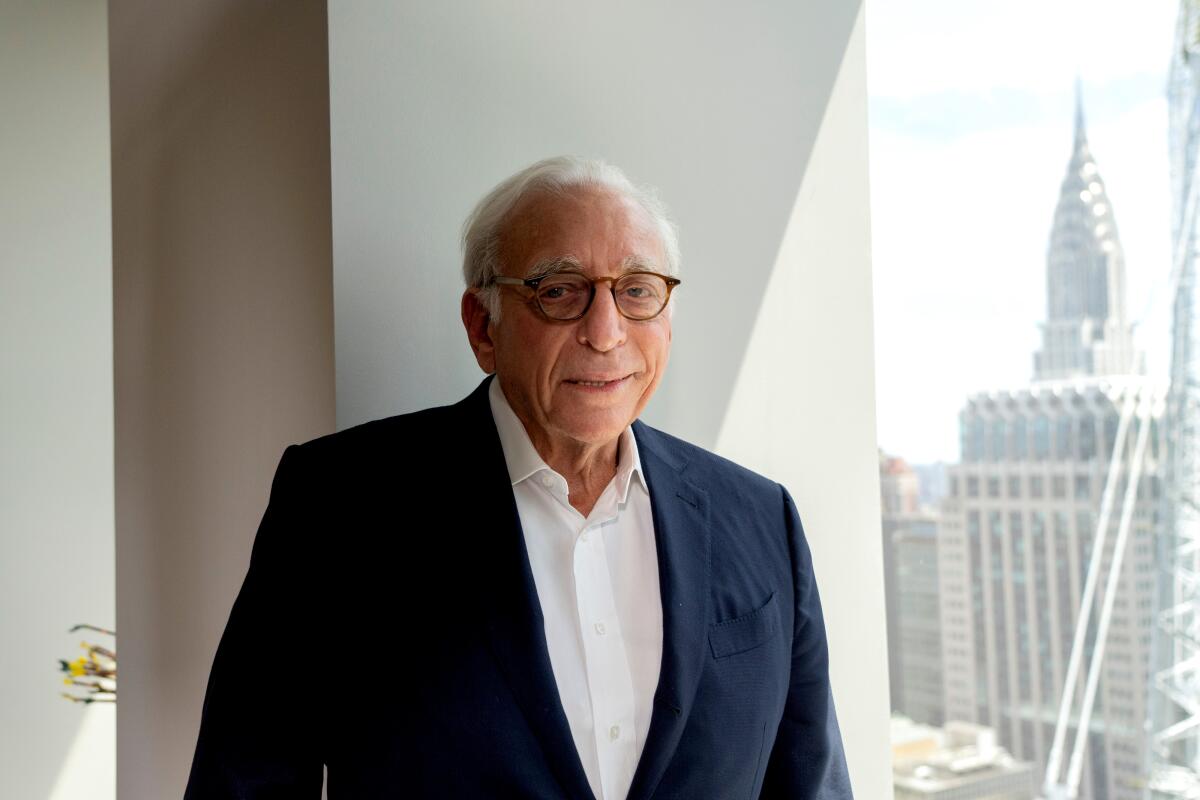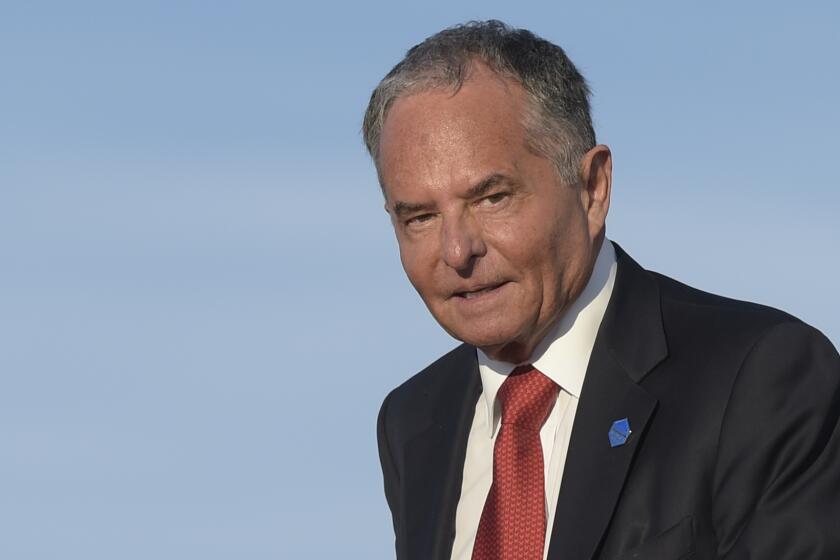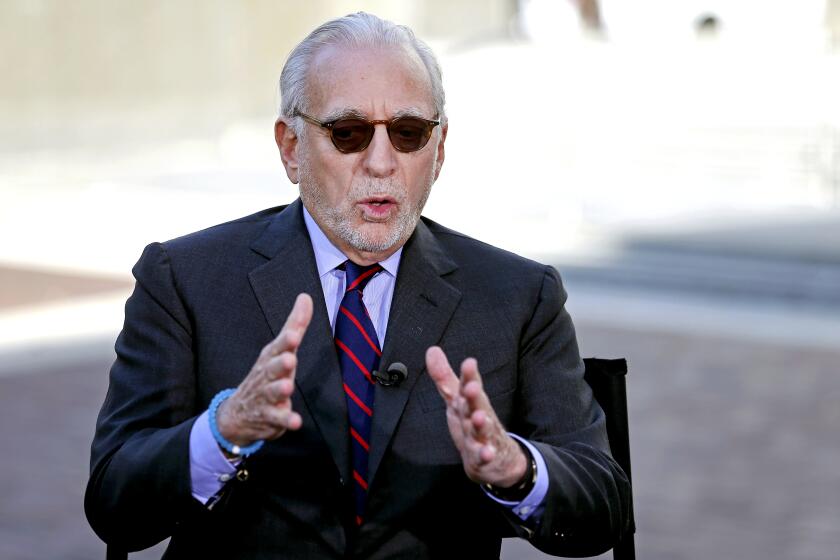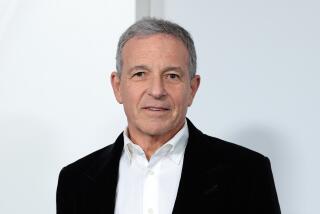Disney says ousted Marvel boss has ‘personal agenda’ against Bob Iger amid proxy fight

- Share via
Activist investor Nelson Peltz is barreling forward with his proxy fight against Walt Disney Co. as his firm, Trian Fund Management, seeks two seats on Disney’s board.
On Thursday, Trian said Disney’s recent appointment of Morgan Stanley Chief Executive James Gorman and former Sky CEO Jeremy Darroch to the board was not enough to “restore investor confidence or address the root cause behind the significant value destruction and missteps that this board has overseen.”
Inside the business of entertainment
The Wide Shot brings you news, analysis and insights on everything from streaming wars to production — and what it all means for the future.
You may occasionally receive promotional content from the Los Angeles Times.
“Disney’s share price has underperformed proxy peers and the broader market over every relevant period during the last decade and over the tenure of each incumbent director,” Trian said in a statement. “Investor confidence is low, key strategic questions loom, and even Disney’s CEO is acknowledging that the Company’s challenges are greater than previously believed. ... Trian intends to take our case for change directly to shareholders.”
The former chief executive of Marvel Entertainment has long been a thorn in the side of Disney CEO Bob Iger.
In response, Disney argued that Peltz’s proxy fight was influenced by former Marvel Entertainment chair Ike Perlmutter’s “longstanding personal agenda” against Disney CEO Bob Iger. Perlmutter, who sought to get a board seat for Peltz earlier this year, was fired by Disney in March amid a larger round of company layoffs. Perlmutter is a major Disney shareholder.
“Mr. Perlmutter owns 78% of the shares that Mr. Peltz claims beneficial ownership of, or more than 25 million of the 33 million shares,” Disney said. “This dynamic is relevant to assessing Mr. Peltz and any other nominees he may put forth as directors, as Mr. Perlmutter was terminated from his employment by Disney earlier this year and has voiced his longstanding personal agenda against Disney’s CEO, Robert A. Iger, which may be different than that of all other shareholders.”
The statement comes after Disney Chief Executive Bob Iger detailed a major restructuring of the company this week, including 7,000 job cuts.
By Thursday afternoon, Disney took another step to satisfy investors by resuming its dividend payments to shareholders at 30 cents a share, which will be made payable on Jan. 10. The move makes good on Iger’s promise to restore dividend payments, which have been on pause for the past three years.
Disney’s stock closed at $92.69, up less than 1%.
The dispute between Peltz and Disney began in late 2022 after Peltz’s Trian acquired more than $800-million worth of shares in Disney. Peltz sought a board seat for himself but eventually backed off in February after Iger laid off thousands of workers and rolled out broad cost cuts at the company.
But in October, a month before Disney reported its fiscal fourth quarter earnings, Peltz went on the offensive again after increasing his stake in Disney to about 30 million shares, or roughly $2.5 billion.
The renewed fight poses yet another challenge to Iger’s leadership at Disney after he returned as CEO in late 2022. Iger, who in an internal town hall with employees this week acknowledged the “myriad challenges” he has faced in “fixing” the company, has sought to reduce Disney’s streaming losses and find a path forward for the company’s linear TV assets, which include ABC, ESPN and the Disney Channel.
Earlier this month, Disney said it shrunk its streaming losses during the fourth fiscal quarter to $387 million, down from the $1.47 billion the company bled the previous year from direct-to-consumer services Disney+, Hulu and ESPN+. Between July and September, Disney+ — which raised its prices from $10.99 a month to $13.99 a month for the ad-free tier — gained 7 million subscribers during the quarter, mostly from international countries.
But the company soon will have a big bill to foot as it prepares to buy out Comcast’s 33% stake in Hulu for at least $8.61 billion, depending on the results of an appraisal process for the streaming service that’s expected to wrap up next year.
As for Disney’s film output, Iger has admitted that the company’s franchise mania around popular intellectual property — particular from its Marvel brand, whose latest movie entry, “The Marvels,” has underperformed at the box office — has led to a decline in quality and fatigue among audiences.
“Quality needs attention to deliver quality,” Iger said at the New York Times’ Dealbook Summit on Wednesday. “It doesn’t happen by accident. And quantity, in our case, diluted quality, and Marvel has suffered greatly from that.”
When asked about Disney’s position in an increasingly polarized political climate, Iger said the company has focused too much on “messaging” at the expense of its storytelling. Disney has taken heat from conservative politicians and commentators for featuring LGBTQ+ and other underrepresented characters in its programming.
“I like being able to entertain if you can infuse it with positive messages and have a good impact on the world,” Iger said. “But that should not be the objective. When I came back, what I have really tried to do is to return to our roots, which is remember: We have to entertain first. It’s not about messages.”
But the CEO pushed back on arguments that Disney has become too “political.”
“There’s a time and a place for companies to weigh in on issues, and it’s actually something that I think CEOs get paid to do,” Iger said.
More to Read
Inside the business of entertainment
The Wide Shot brings you news, analysis and insights on everything from streaming wars to production — and what it all means for the future.
You may occasionally receive promotional content from the Los Angeles Times.













